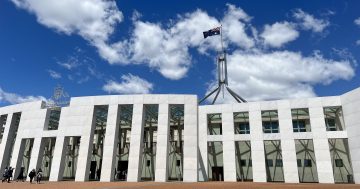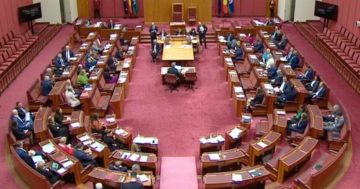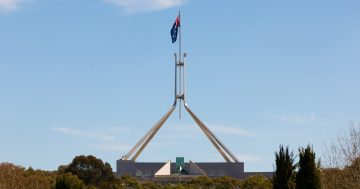
The government didn’t get its way when it tried to rush immigration detention legislation through both houses of parliament. Photo: James Coleman.
In the complicated, convoluted and controversial world of immigration policy, the Albanese Government was convincingly outplayed in the final parliamentary sitting days before Easter.
Severely embarrassed is not too strong a term to describe what went down.
Being too clever by half is another term that fits.
Being just clever enough and seizing their moment to rain on the government’s parade is how you might say the Liberals played it.
Crossbenchers in the Senate? Simply outstanding.
Immigration Minister Andrew Giles, visibly worn down by the Opposition’s attacks on him in the Lower House over High Court rulings to release detained asylum seekers into the community, came up with what he must have thought was an ingenious idea.
The Migration Amendment (Removals and Other Measures) Bill 2024 seeks to make it easier to deport non-citizens and harder for detainees to challenge the immigration system in the High Court.
It would also give an immigration minister exceptional powers to pause visas for citizens of countries that will not take refugees back.
The merits of whether it is actually an ingenious idea can be debated elsewhere, and they will be now that the Senate has decided to give this bill far more scrutiny than the government wanted.
In what has turned out to be an amateur hour of juvenile politicking, the Labor government described the bill as so urgent that it must pass successfully through both houses of parliament within 48 hours.
The government only briefed the Opposition on it the morning before it was introduced. That was Tuesday (26 March).
As stunned as it was, the Coalition voted with Labor to pass the bill in the House of Representatives with barely a shred of debate and only two hours after the legislation was introduced to parliament.
Crossbench protestations – and human rights concerns – were ignored.
Yet, while Labor got what it wanted in the House, the Senate had other ideas.
A hastily arranged inquiry for late the same evening was agreed to, which only exposed how little the bureaucracy knew about the government’s intentions.
That’s when the Senate proved its value to our democratic system.
And that’s when the Opposition played a better hand than the government.
The crossbench was never going to agree to rush such hastily put-together legislation through parliament without proper scrutiny, especially when so many human and legal rights are at stake.
But the crossbench on its own doesn’t have the numbers. Not in the Reps. Not in the Senate.
It was shut down in the Lower House, but in the Upper (to the Greens’ and independents’ surprise), the Coalition agreed to send the bill to committee, not to return for at least six weeks.
That allowed the crossbench to rail on the government for its contempt for proper parliamentary process and the Coalition to look like the adults of the two major parties.
Yes, this was too important to rush through, they said.
Typical of this Labor government, they bemoaned. Instead, let’s look into this bill thoroughly.
The government wasn’t expecting that from an Opposition that probably agrees to every harsh move it is trying to make against asylum seekers.
That was how Wednesday (27 March) played out – with Labor insisting the bill had to pass now, while the Coalition and crossbench saying no.
It also allowed the Opposition to grill Home Affairs Minister Clare O’Neil over an altercation she reportedly had with her department boss, Stephanie Foster, over information being disclosed on crimes committed or allegedly committed by released immigration detainees.
It was an altercation that apparently left Ms Foster in tears.
So while the bill will likely pass (eventually) with amendments the government will be forced to agree to, Labor enters the parliamentary break wounded.
The Coalition, however, ended the session with a significant win.
The crossbench, as usual, is doing its best to keep them all accountable.
Original Article published by Chris Johnson on Riotact.










